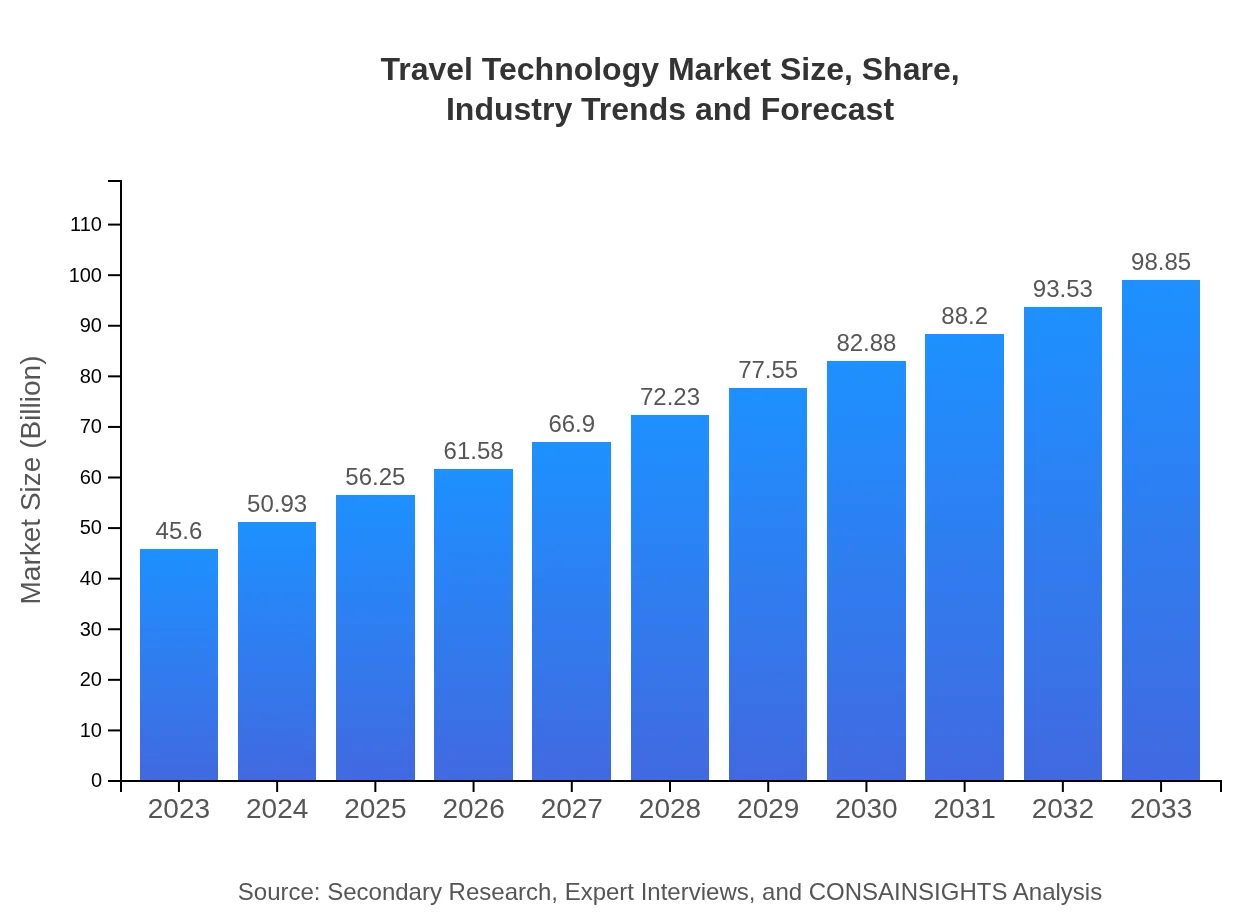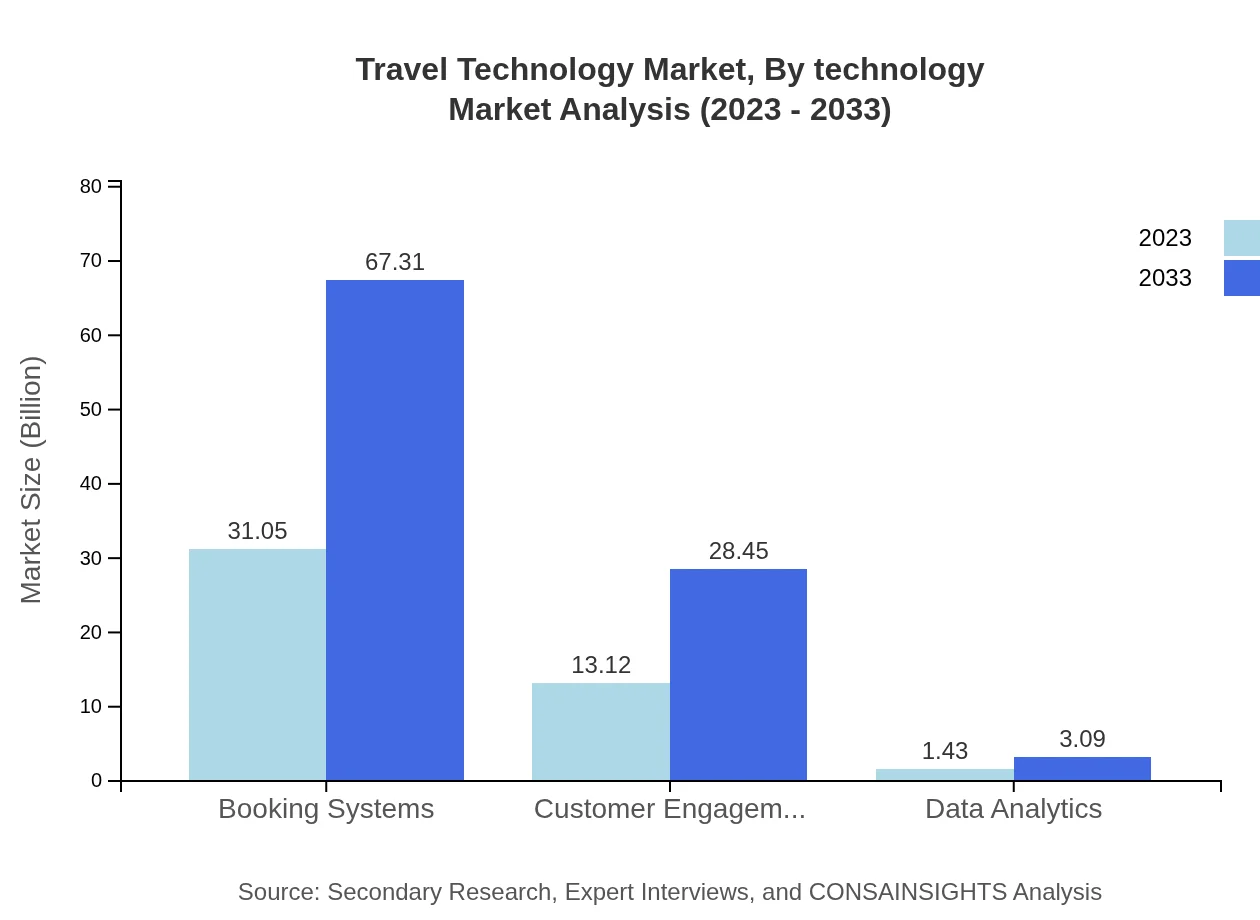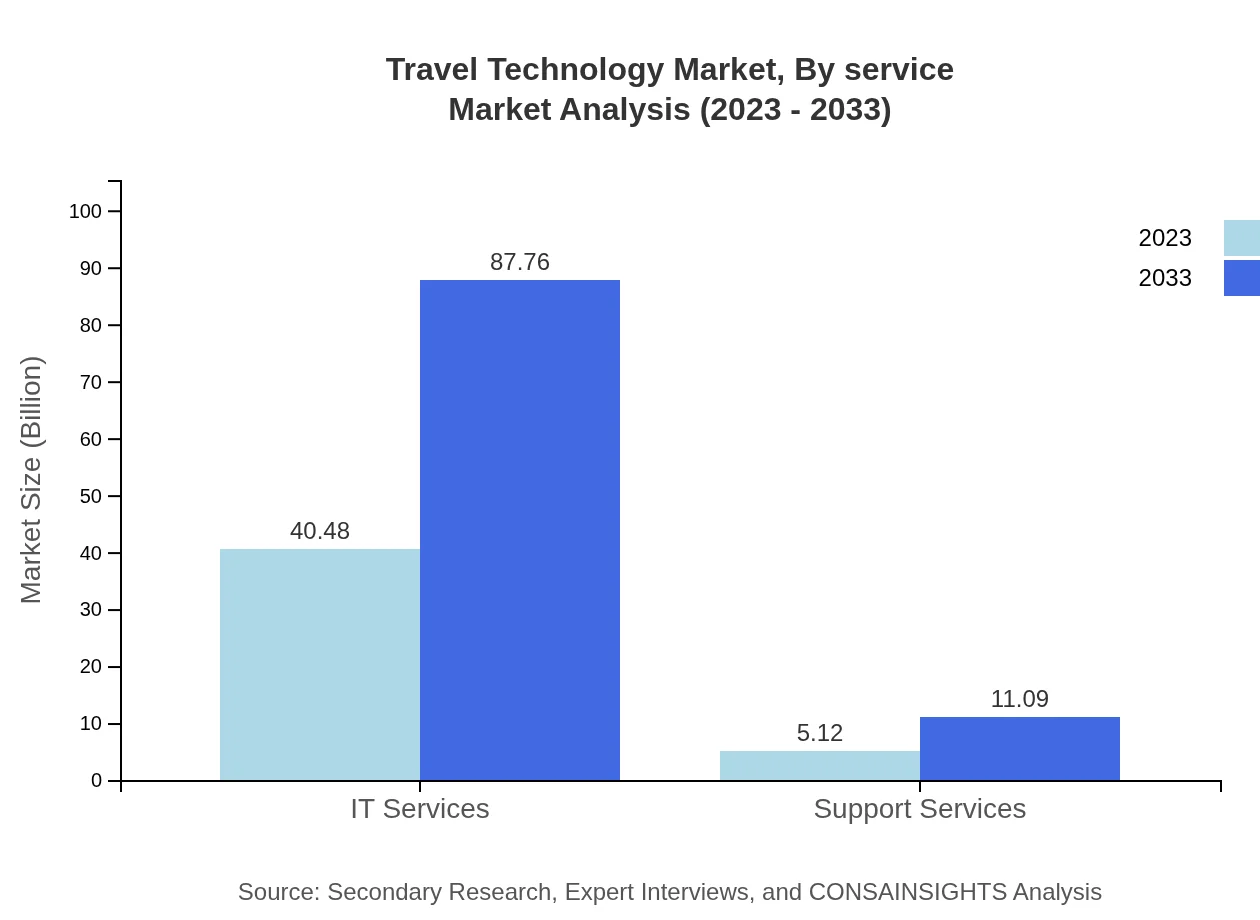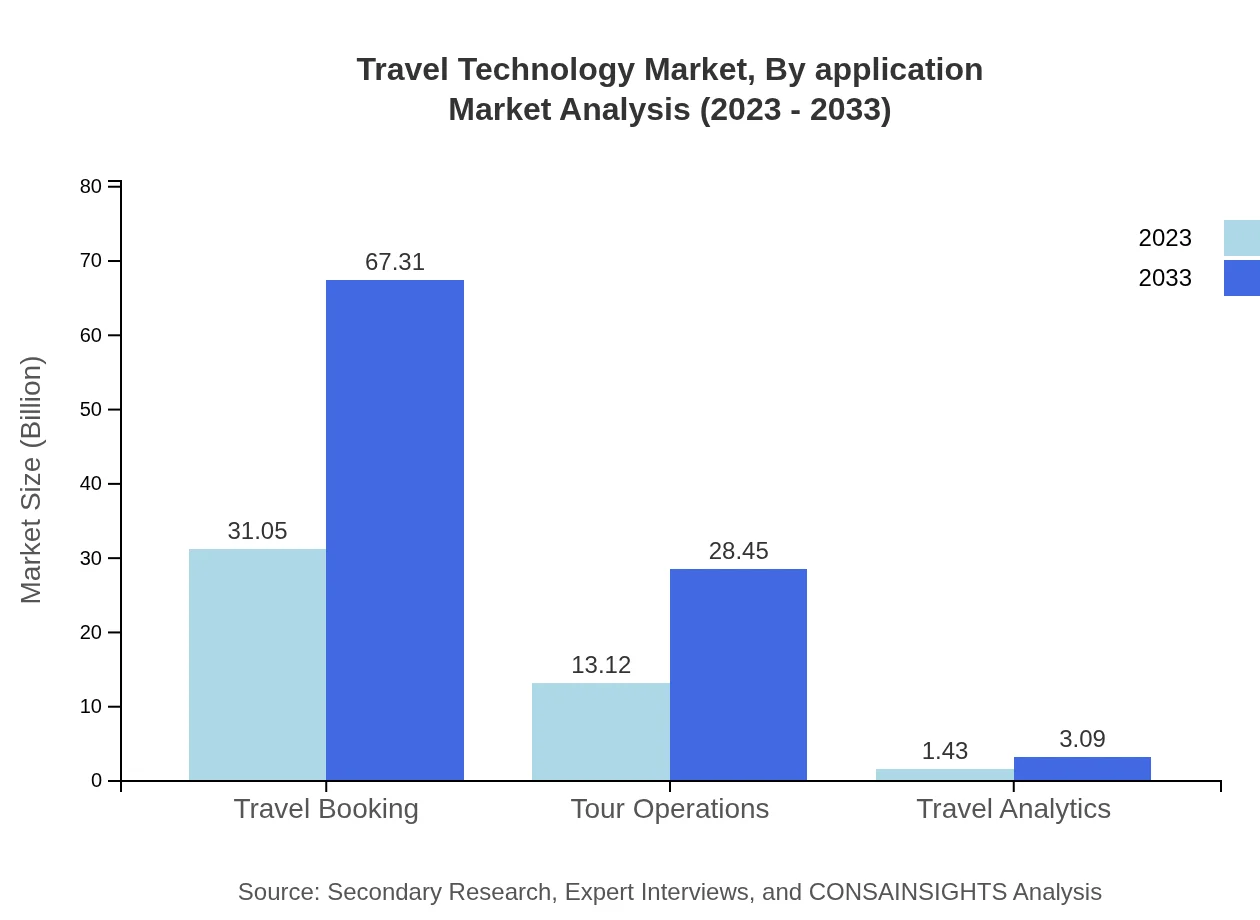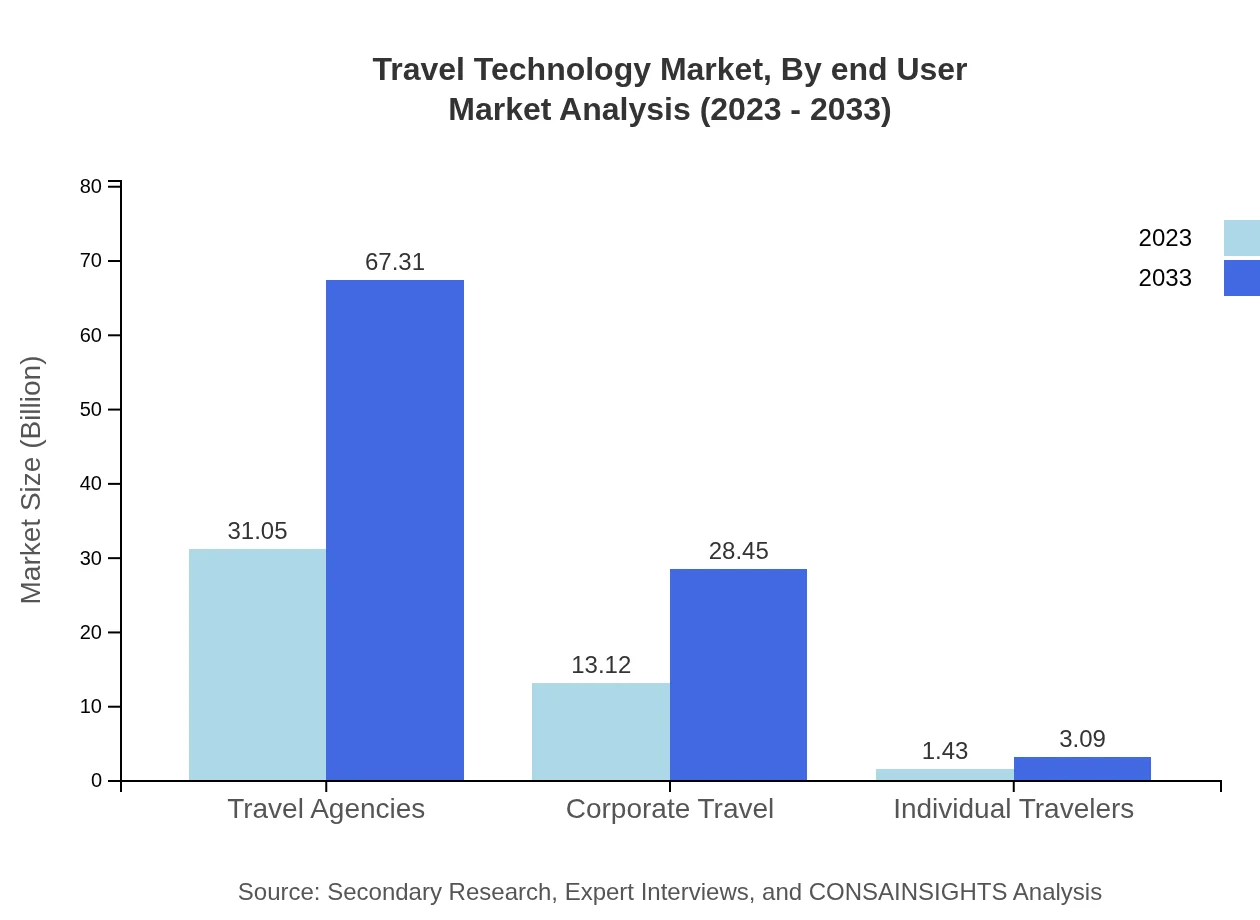Travel Technology Market Report
Published Date: 31 January 2026 | Report Code: travel-technology
Travel Technology Market Size, Share, Industry Trends and Forecast to 2033
This report provides an in-depth analysis of the Travel Technology market, focusing on key insights, trends, and growth forecasts for the period 2023-2033, including market size, segment analysis, regional insights, and a look at key players in the industry.
| Metric | Value |
|---|---|
| Study Period | 2023 - 2033 |
| 2023 Market Size | $45.60 Billion |
| CAGR (2023-2033) | 7.8% |
| 2033 Market Size | $98.85 Billion |
| Top Companies | Amadeus IT Group, Sabre Corporation, Travelport, Expedia Group |
| Last Modified Date | 31 January 2026 |
Travel Technology Market Overview
Customize Travel Technology Market Report market research report
- ✔ Get in-depth analysis of Travel Technology market size, growth, and forecasts.
- ✔ Understand Travel Technology's regional dynamics and industry-specific trends.
- ✔ Identify potential applications, end-user demand, and growth segments in Travel Technology
What is the Market Size & CAGR of Travel Technology market in 2023?
Travel Technology Industry Analysis
Travel Technology Market Segmentation and Scope
Tell us your focus area and get a customized research report.
Travel Technology Market Analysis Report by Region
Europe Travel Technology Market Report:
Europe’s Travel Technology market size was approximately $15.34 billion in 2023, forecasted to reach $33.26 billion by 2033. The region benefits from a well-established travel sector, continuous technological innovation, and strong demand for improved travel services. European consumers are particularly interested in sustainable and eco-friendly travel solutions.Asia Pacific Travel Technology Market Report:
In the Asia Pacific region, the Travel Technology market was valued at $8.33 billion in 2023, expected to grow to $18.05 billion by 2033. The expansion is fueled by increasing internet penetration, a rising middle class, and growing travel expectations among consumers. This region is witnessing rapid digital transformation with a strong emphasis on mobile technologies and online platforms.North America Travel Technology Market Report:
North America is one of the leading markets for Travel Technology, valued at $15.90 billion in 2023, and projected to grow to $34.46 billion by 2033. The high adoption of advanced technologies, robust infrastructure, and the presence of key industry players drive this market. Consumers in this region are increasingly leaning towards personalized travel experiences, promoting technological solutions.South America Travel Technology Market Report:
The South American Travel Technology market was valued at $4.22 billion in 2023 and is projected to reach $9.14 billion by 2033. Factors contributing to this growth include a growing interest in global travel and the modernization of travel services. Local innovations and partnerships between technology firms and travel agencies are expected to further boost market growth.Middle East & Africa Travel Technology Market Report:
In the Middle East and Africa, the Travel Technology market was valued at $1.81 billion in 2023, with expectations to grow to $3.93 billion by 2033. The market is supported by increasing tourism, governmental initiatives to promote travel, and a growing emphasis on digital services. However, challenges such as infrastructure and regional instability may hamper growth.Tell us your focus area and get a customized research report.
Travel Technology Market Analysis By Technology
The Travel Technology market's IT services segment dominated with a size of $40.48 billion in 2023 and is projected to reach $87.76 billion by 2033, corresponding to a significant share of 88.78%. Support services follow with revenues of $5.12 billion in 2023, expected to grow to $11.09 billion by 2033.
Travel Technology Market Analysis By Service
Travel Agencies are a key segment with a value of $31.05 billion in 2023, expected to rise to $67.31 billion by 2033. This segment holds a substantial share of 68.09% in the market. Corporate Travel is another significant segment, increasing from $13.12 billion in 2023 to $28.45 billion by 2033.
Travel Technology Market Analysis By Application
The market for Booking Systems is valued at $31.05 billion in 2023, growing to $67.31 billion by 2033 with a sustainable share of 68.09%. Customer Engagement applications are valued similarly, showcasing their importance in enhancing traveler interactions.
Travel Technology Market Analysis By End User
The segment for Individual Travelers, although smaller, is growing, with a size of $1.43 billion in 2023 anticipated to reach $3.09 billion by 2033. This reflects changing travel dynamics and the importance of catering to individual preferences within the broader market.
Travel Technology Market Trends and Future Forecast
Tell us your focus area and get a customized research report.
Global Market Leaders and Top Companies in Travel Technology Industry
Amadeus IT Group:
Amadeus provides advanced technology solutions for the travel industry, focusing on improving travel experiences through innovative IT solutions and data analytics.Sabre Corporation:
Sabre offers software and data solutions for airlines, hospitality providers, and travel agencies, aiming to enhance operational efficiency and customer engagement.Travelport:
Travelport provides distribution, technology, and payment solutions to the global travel industry, facilitating effective travel management and booking.Expedia Group:
As a leading online travel agency, Expedia focuses on providing comprehensive travel solutions, leveraging technology to enhance booking and customer interactions.We're grateful to work with incredible clients.









FAQs
What is the market size of travel Technology?
The travel technology market is projected to reach approximately $45.6 billion by 2033, growing at a compound annual growth rate (CAGR) of 7.8%. This growth reflects the increasing adoption of digital tools in the travel industry.
What are the key market players or companies in the travel technology industry?
Key players in travel technology include major companies like Amadeus IT Group, Sabre Corporation, Travelport, and Expedia Group. These companies are pivotal in shaping industry standards through innovative technology solutions.
What are the primary factors driving the growth in the travel technology industry?
The growth in travel technology is driven by factors such as increasing digitalization, rising consumer demand for personalized travel experiences, and the need for efficient travel management solutions to optimize operations and reduce costs.
Which region is the fastest Growing in the travel technology?
The fastest-growing region for travel technology is Europe, anticipated to grow from $15.34 billion in 2023 to $33.26 billion by 2033. This growth underscores the region's strong technological adoption and extensive travel infrastructure.
Does ConsaInsights provide customized market report data for the travel technology industry?
Yes, ConsaInsights offers customized market reports tailored to specific needs within the travel technology sector, allowing businesses to gain insights and data relevant to their strategic planning.
What deliverables can I expect from this travel Technology market research project?
Deliverables include comprehensive market analysis reports, growth forecasts, competitive landscape insights, regional market data, and breakdowns by segment, helping guide strategic business decisions.
What are the market trends of travel technology?
Current trends in travel technology include an emphasis on AI and machine learning for personalized services, mobile booking applications gaining popularity, and a growing focus on sustainability and eco-friendly travel solutions.

